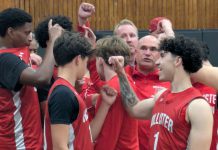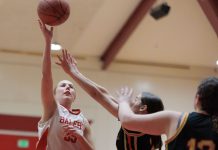
Ray Trevino won gold in the visually-impaired golf division at
the Golden Age Games
— a category he helped pioneer
Danny Rhines can still recall the first time he met Hollister’s
Ray Trevino four years ago. With Trevino’s drive and ambition,
though, he’d be a difficult person to forget.
Ray Trevino won gold in the visually-impaired golf division at the Golden Age Games — a category he helped pioneer
Danny Rhines can still recall the first time he met Hollister’s Ray Trevino four years ago. With Trevino’s drive and ambition, though, he’d be a difficult person to forget.
“He came to us as a visually-impaired golfer,” said Rhines, a coach with the Golden Aged Bears, which is made up of veteran athletes from Central California who receive care through the VA Palo Alto Health Care System.
“I’ve been coaching for the last nine years,” Rhines added, “and he was the first [visually-impaired golfer] we had ever taken to the games.”
And the games — otherwise known as the National Veterans Golden Age Games, which is considered the largest organized sporting event in the world for senior veterans — may have changed because of Trevino.
Having competed in visually-impaired horseshoes, bowling and shuffleboard in recent years, and having earned medals in the latter two events, Trevino found himself early on playing golf, his true passion, against sighted players.
And, at first, he was the only one doing so.
“But this year, we had enough (blind players) to make our own division,” said Trevino, who is blind in his left eye and has tunnel vision in his right, which limits his peripheral vision and allows him to see just a few feet straight ahead.
“They told me when I went there the first year that you don’t have to play (golf). And I was like, ‘Yes, I do,'” Trevino added. “[Golf] was my thing and it finally happened. Everything just worked out.”
Although he earned a gold medal in visually-impaired shuffleboard and a silver in bowling this year, Trevino’s gold-medal winning performance in visually-impaired golf may just hold the greatest importance for the Korean War veteran.
Competing four years ago as the only blind golfer on the links, the 72-year-old Trevino has since seen the number of visually-impaired golfers increase every year, all leading up to the newly implemented visually-impaired division at the Golden Age Games last May in Iowa.
“This was big time for blind golfers,” he said.
Although organizations like the United States Blind Golf Association exist, it was Trevino’s pioneering attitude that helped change the tide at the Golden Age Games.
Kathy Kelley, a recreational therapist at the Western Blind Rehabilitation Center, which is part of the VA Palo Alto Health Care System, met Trevino four years ago during a program that was geared toward teaching sports to the blind.
Trevino was one of the first blind golfers she had met, but certainly not the last.
“A lot of vets, after they’ve lost their vision, they throw their golf clubs away, they throw their bowling balls away, because they don’t see the purpose for it,” Kelley said.
“But Ray is out there showing everyone what the visually impaired can do. What he was talking about, I was able to learn and spread to the other vets.”
Often times, Kelley added, those visually impaired find themselves performing better in the game of golf than when they had vision.
Aided by a person to assist the golfer — the assistant is able to offer advice on the direction to hit the golf ball and the distance needed for the shot — some 13 visually-impaired golfers competed last May at the Golden Age Games.
“But he was the first,” Rhines said. “He kind of paved the way for other golfers and he didn’t let anyone deter him for doing that. With his persistence and patience, he was able to do that.
“If it were not for him, there probably would be no visually impaired category (at the Golden Age Games).”
Despite his impairment — he lost vision in his left eye due to complications with diabetes nine years ago — Trevino finished approximately 15 strokes short of medaling last year in golf, against sighted players.
This year, Trevino and his seeing-eye dog Thorn carded a nine-hole score of 69, and narrowly defeated Wilber Cherry (70) in the 70-74 age division.
“When we were playing against sighted players, we really didn’t have a chance,” Trevino said. “If you don’t win something, it takes a lot out of it.”
Kelley said Trevino is always excited and passionate about the sport, although at times would become discouraged having to play against sighted competitors.
“But we all do that. It’s difficult,” Kelley added. “It was an uphill battle for him. But this year was a turning point.”
There are now eight visually-impaired athletes with the Golden Aged Bears, three of whom play golf. And having seen the numbers grow each and every year, Trevino hopes to continue stirring awareness both locally and nationally for his sport and the games, which had 28 visually-impaired athletes competing in Iowa.
Said Trevino, “It was one hell of a good year.”









